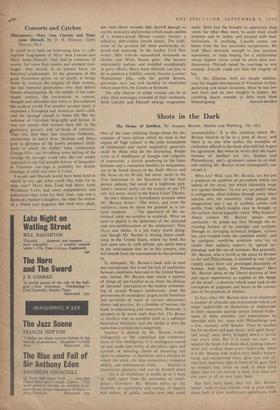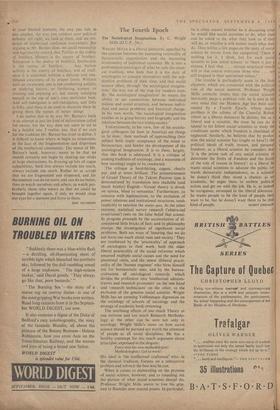Shots in the Dark
The House of Intellect. By Jacques Barzun. (Seeker and Warburg, 32s. 6d.)
ONE of the most irritating things about the dis- cussions of mass culture which we read in our organs of 'high culture' is the calm assumption of intellectual and moral superiority generally made by those who do the discussing. People write as if shoddiness of thought and vulgarity of expression, a slavish pandering to the latest fashions and a rancorous hostility to seriousness, are to be found always in the Daily Mirror and the News of the World, but never, never in the New Statesman or the Spectator; in our local picture palaces, but never at a highbrow pub- lisher's cocktail party: on the screens of our TV sets, but never, never in the Royal Court Theatre.
So one's interest is immediately aroused when • ,Mr. Barzun writes : 'The worst, and even the mediocre, must be taken for granted as a cul- tural constant. . . The ignorance of the un- lettered takes no scrutiny to establish. What we need to plumb is the ignorance of the educated and anti-intellectualism of the intellectual.' Now there, one thinks, is a job really worth doing; and though Mr. Barzun is writing about condi- tions in the United States, where his book has now gone into its sixth edition, one settles down in the anticipation that we in this country, too, will benefit from the examination he has promised us.
If, Unhappily, Mr. Barzun's book fails to meet our anticipation, this is not for lack of similarities between conditions here and in the United States; and, indeed, Mr. Barzun does attack a number of things all too familiar to us, from the idiocies of 'personal' journalism to the modish orientalis- ing of certain Western intellectuals; from the pretensions of sociologists' jargon to the banalities and servilities of much of current educational theory and practice. As a chamber of horrors, the book is entertaining and instructive. However, it purports to be much moic than this. 7'he House of Intellect tries to establish itself as a coherent theoretical structure; and the harder it tries the more does it arouse one's misgivings.
Intellect is defined by Mr. Barzun (rather inelegantly) as 'the capitalised and communal form of live intelligence; it is intelligence stored up and made into habits of discipline, signs and symbols of meaning, chains of reasoning and spurs to emotion—a shorthand and a wireless by which the mind can skip connectives, recognise ability, and communicate truth. . . . Intellect is community property and can be handed down . . . [it] is an institution; it stands up as it were by itself, apart from the possessors of intelli- gence.' Elsewhere Mr. Barzun refers to 'the tradition of explicitness and energy, of inquiry and debate, of public, secular tests and social
accountability.' It is this tradition which Mr. Barzun believes to be in a state of decay, and there is no one who studies the examples of confusion offered in the book who will fail to give his agreement. But when he writes that the major enemies of Intellect are Art, Science and Philanthropy, one's agreement comes to an end; and nothing Mr. Barzun writes subsequently can restore it.
Why Art? Well, says Mr. Barzun, 'art has put a premium on qualities of perception which are indeed of the mind, but which ultimately wage war against Intellect.' In our art, we prefer 'what is ambiguous, what titillates through irony, what touches only the sensibility, what plunges the imagination into a sea of symbols, echoes and myths, from which insights may be brought to the surface, but no arguable views.' Why Science? About science Mr. Barzun speaks more cautiously: he points out that 'through the in- creasing fantasy of its concepts and symbols, through its diverging technical tongues, science has also receded from the common world'; and he castigates would-be scientists who try to render their subjects esoteric by special ter- minology and the use of numbers. But generally, Mr. Barzun, who is lavish in the space he devotes to Art and Philanthropy, is inclined to veer rather rapidly away from any prolonged discussion of Science. And lastly, why Philanthropy? Here Mr. Barzun speak of the 'liberal doctrine of free and equal opportunity as applied to the things of the mind'—a doctrine which must lead to the corruption of judgment and hence to the corrup- tion of the products of intellect.
In fact, what Mr. Barzun does is to enumerate a number of attitudes and expectations which are either undesirable in themselves or undesirable in their extension outside certain limited fields: some of these attitudes and expectations he identifies with Art, some with Philanthropy and a few, uneasily, with Science. Then he reaches for his revolver and goes bang! and again bang! and bang! once more, bringing down a sacred cow every time. But it is much too easy: no wonder the beasts fall down dead, leaking cotton- wool and sawdust from every bullet-hole, when it is Mr. Barzun who stuffed their bodies before- hand, and manoeuvred them, glass eyes and all, into their positions right in front of his gun. And no wonder, too, when we look at them lying there, that we are moved to deny that these are our cows at all or ever have been.
But they have been, they are, Mr. Barzun insists : look at your schools, look at your maga- zines, look at your intellectual conferences, look
at your learned journals, the way you talk to one another, the way you conduct your political debates. All right, we look at them, and see evi- dence of intellectual confusion everywhere. But arguing as Mr. Barzun does, we could reasonably and legitimately remark that Politics is the enemy of Intellect, History is the enemy of Intellect, Education is the enemy of Intellect, Intellection
is the enemy of Intellect. . . Any human activity is the enemy of Intellect, and of itself, once it is exercised without a delicate and con- tinuous awareness of its proper limits. Without such an awareness, one is not conducting politics, or studying history, or furthering science, or creating and enjoying art, but merely indulging oneself to the top of one's own particular bent. And self-indulgence is self-indulgence, and folly is folly, and there is no need to decorate them by giving them the names of better things.
I do realise that in its way Mr. Ba.rzun's book is an attempt at just the kind of delimitation called for above; but the way does not seem to me to be a helpful one. I realise, too, that if we care
• for the tradition Mr. Barzun has tried to define, it is difficult to know where to begin its restoration, in the face of the fragmentation and dispersion of the intellectual community. The moral of Mr. Barzun's book, however, seems to be that we should certainly not begin by shaking our sticks at large abstractions, by drawing up lists of vague culpabilities. Such lists always include too much, always exclude too much. Rather let us accept that we are fragmented and dispersed, and for the moment can do no more, and can do no better, than to watch ourselves and others; to watch par- ticularly those who assure us that we could be brought together again, if only we would close our eyes for a moment and listen to them.
DAN JACOBSON



































 Previous page
Previous page